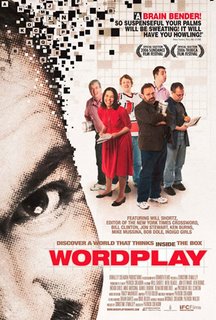Excessive Verbosity in Grid Form
 College life gives some opportunities that you can never get again, namely access to free newspapers. At Tufts I can get the Tufts Daily, the Daily Metro, and the New York Times. Now, not only do these fine pieces of journalism (well, some of them) offer insight into important affiars both local and globally, but they also gave me my first real chance to do crossword puzzles. How else can someone get through a 75 minute lecture on probability?
College life gives some opportunities that you can never get again, namely access to free newspapers. At Tufts I can get the Tufts Daily, the Daily Metro, and the New York Times. Now, not only do these fine pieces of journalism (well, some of them) offer insight into important affiars both local and globally, but they also gave me my first real chance to do crossword puzzles. How else can someone get through a 75 minute lecture on probability?I happened to catch Wordplay at the perfect time in my life for me to love it and appreciate it. It's a film about our isolationism and how it can unite us. It doesn't put its point forward as effectively as Metal: A Headbanger's Journey or American Hardcore, which attack different issues with the same thesis, but Wordplay remains an entertaining journey into the way we can cut ourselves off from the world and still be a part of the crowd.
The main problem with the film is that this look into intellectualism is never targeted at anyone besides the very intellectuals who do the daily crossword. The film begins by running through a list of celebrities who do the New York Times crossword, and ends with a competition a la Spellbound. In between, we meet the competitors we will see at the end, and this is where the film makes some of its greatest successes. By learning about the people who love crosswords enough to enter this competition, we get a glimpse into a a different aspect of the high brow intellectual, the one that can separate us from the rest of the world.
By introducing us to these characters seperately, we get to know them before we see them interact with each other at the American Crossword Tournament. This is the part that adds perspective to the characters and allows them to become more than isolated intellectuals. However, it takes away from the idea of our interest in ourselves and our entertainment isolating us from the greater world. It gives these people a way to congregate and make connections that they wouldn't ordinarily be able to make. And it's all thanks to Will Shortz.
Wordplay was originally supposed to be a tribute to Shortz, but it focuses much less on the man himself than his works and what has come of them. The most about Shortz is given through Merl Reagle, a man who writes crosswords which Shortz edits. We see Reagle creating a puzzle, and we get to see Shortz edit it. This gives us a better idea of the man behind the puzzles than the competition, if only it shows us how much he loves what he does. We are given his background, but seeing how he works is a key in understanding the man.
Occasionally informative, Wordplay can still be entertaining, and the end of the competition works very well as a solid moment of tension. Wordplay proves how well it works by making us feel for the competitors, especially poor Al Sanders.
**1/2 / ****


0 Comments:
Post a Comment
Subscribe to Post Comments [Atom]
<< Home